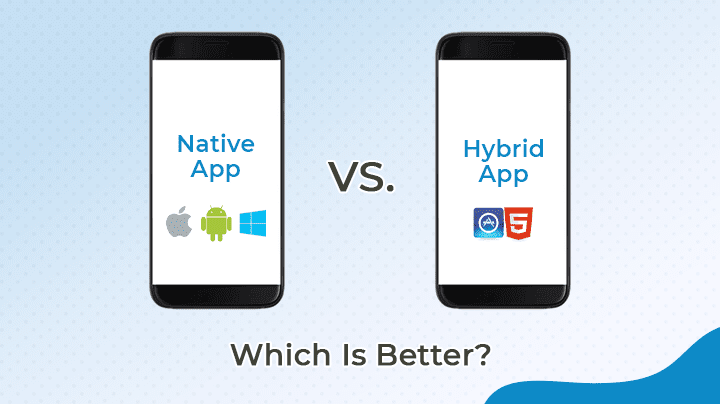
In mobile app development, to differentiate a native app with its hybrid counterpart involves a comparative analysis of the attributes that each app respectively endows. In this write-up, we have discussed some key points, each underscoring the fact of whether you should go for a native app or a hybrid alternative, for your future mobile app development needs.
Native Apps
What Is A Native App?
The most unmistakable recognition of a native app is that it is a platform or device-specific software program. For example, Camera+ (for iOS) and KeePassDroid (Android). The optimized performance output that a native app gives is based on its ability to maximize device-specific hardware and software, plus its ability to leverage GPS technology.
This means better user-experience, considering the native apps are generally faster and trustworthy in terms of leveraging on your device’s OS features, like camera, contacts, microphone and so on.
Native Apps – Key Points
- It is a platform or a device-specific software program.
- It provides highly optimized performance yield due to its ability to leverage on the latest features of a device’s hardware and software, plus OS features like camera and contacts, etc.
- Users can install a native app onto any device directly.
- The acquisition of a native app can easily be done through the dedicated App Store. For example, one can choose the Google Play Store for android native apps.
- Native app development for multiple platforms could be a finance-draining process.
- A native app can make the most of your smartphone’s inbuilt features like camera, GPS, and others to give you optimized user experience.
- Key updates frequently in a standalone mode by native apps ensures better security support of your smartphone’s internal data.
- These apps smartly monitor a user’s online habits, thus pushing for relevant product recommendations or anything pertaining to user-specific actions.
Hybrid Apps
What Is A Hybrid App?
A hybrid app is basically a web application encased in a native app shell. You can say it is a combination of native apps and web applications. However, function-wise, these apps rely on native features, thus delivering the experience of web views through the native browser of a smartphone.
To simplify, a hybrid app is simply cast into a native container. A particular framework is used to build hybrid apps, in which the smooth interactions of the apps between hardware and native features of a device and the app’s interface is ensured, using the mechanism called cross-platform APIs.
Hybrid apps – Key Points
- It allows developers to sidestep the mandatory resubmission of a new hybrid app to an app store so as to get the apps updated frequently.
- It allows you to opt for any web-native framework based on your desire.
- The hybrid app development cycle is simplified and rapid, apart from easy maintenance.
- You can codify the app and switch to any platform.
- The shortcoming of a hybrid app is its dependence on the native browser.
- It can work whether or not the device is connected.
- You can easily integrate your smartphone’s file system with the app.
- Patches and updates can be launched easily.
- Developing a hybrid app is cheaper than building two versions of native apps for two separate platforms.
Conclusion
The above-mentioned analysis of native apps and hybrid apps leads us to this conclusion that they are respectively genius at performing certain specific tasks commensurate with your individual requirement.
Therefore, all you need to figure out, in the first place, before choosing either of the apps (hybrid or native apps), make sure you have understood your needs. The above analysis also clears that while native apps outweigh their hybrid counterparts on a certain degree of importance, hybrid apps, on another hand, can’t be denied from implementation in your needs, provided you know to differentiate the capability of both the apps respectively.
For businesses to choose between a native app and a hybrid app can be a dilemma, unless they understand what their customers need. In fact, your customers are not technically expert to figure out what powers up an app in the background. All they want is the simplified performance of the app they use with enhanced and cheerful user-experience.
Therefore, you should choose a hybrid app over a native app or vice versa, subject to your customer’s exact requirement. Because, to say which one is better would quite be an understatement, considering each one has its respective potential, in terms of performance and user experience for your business.








